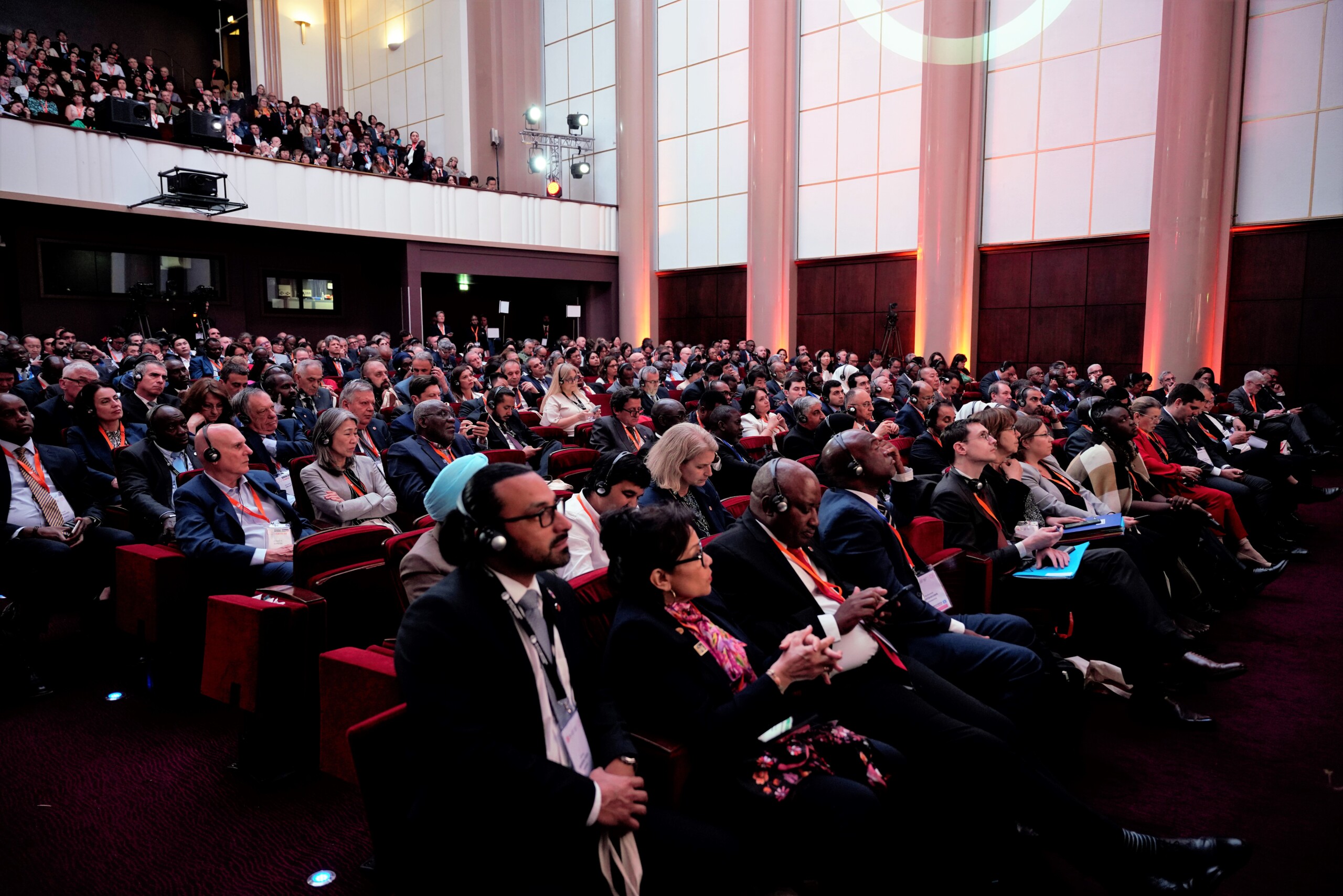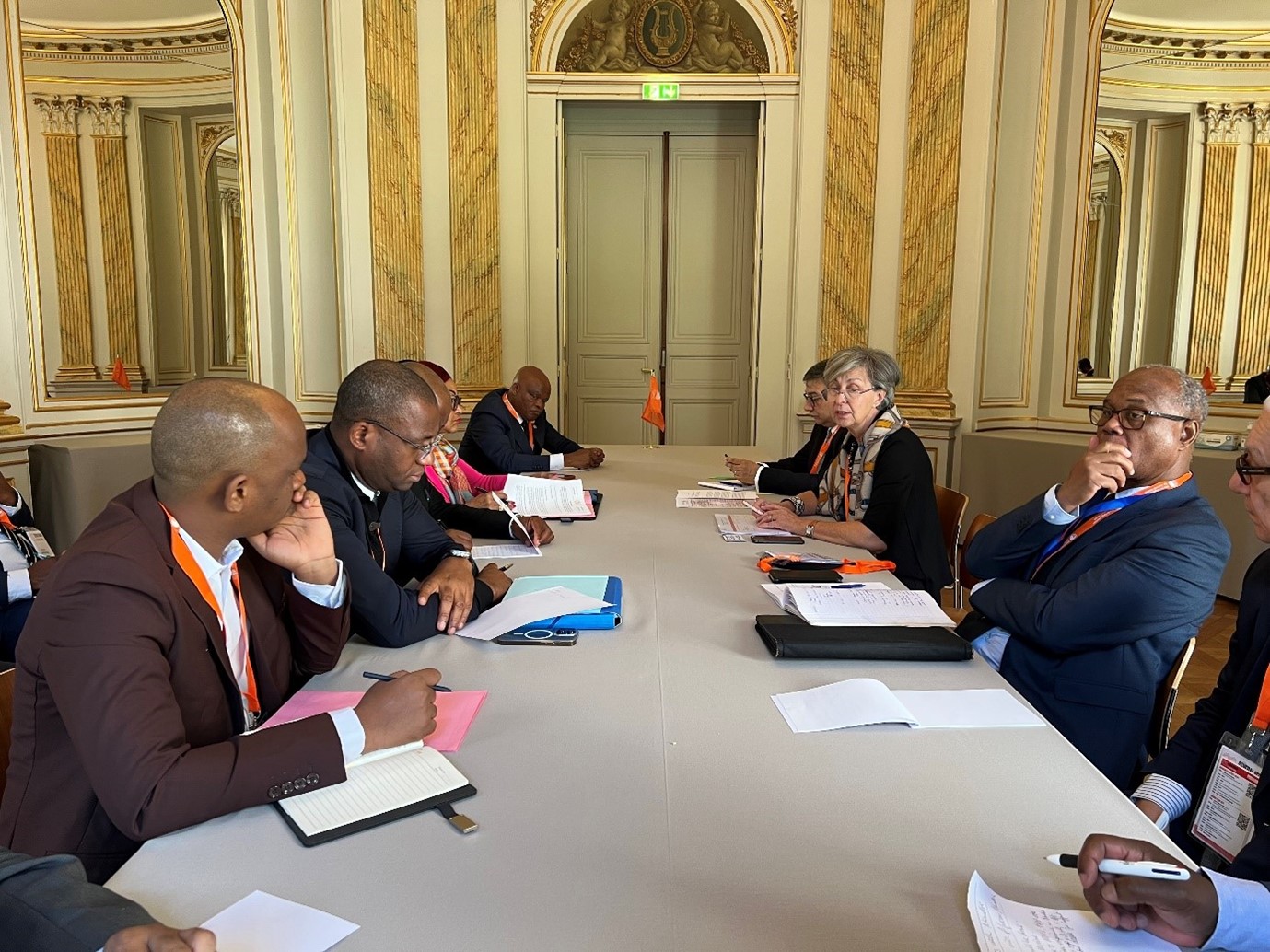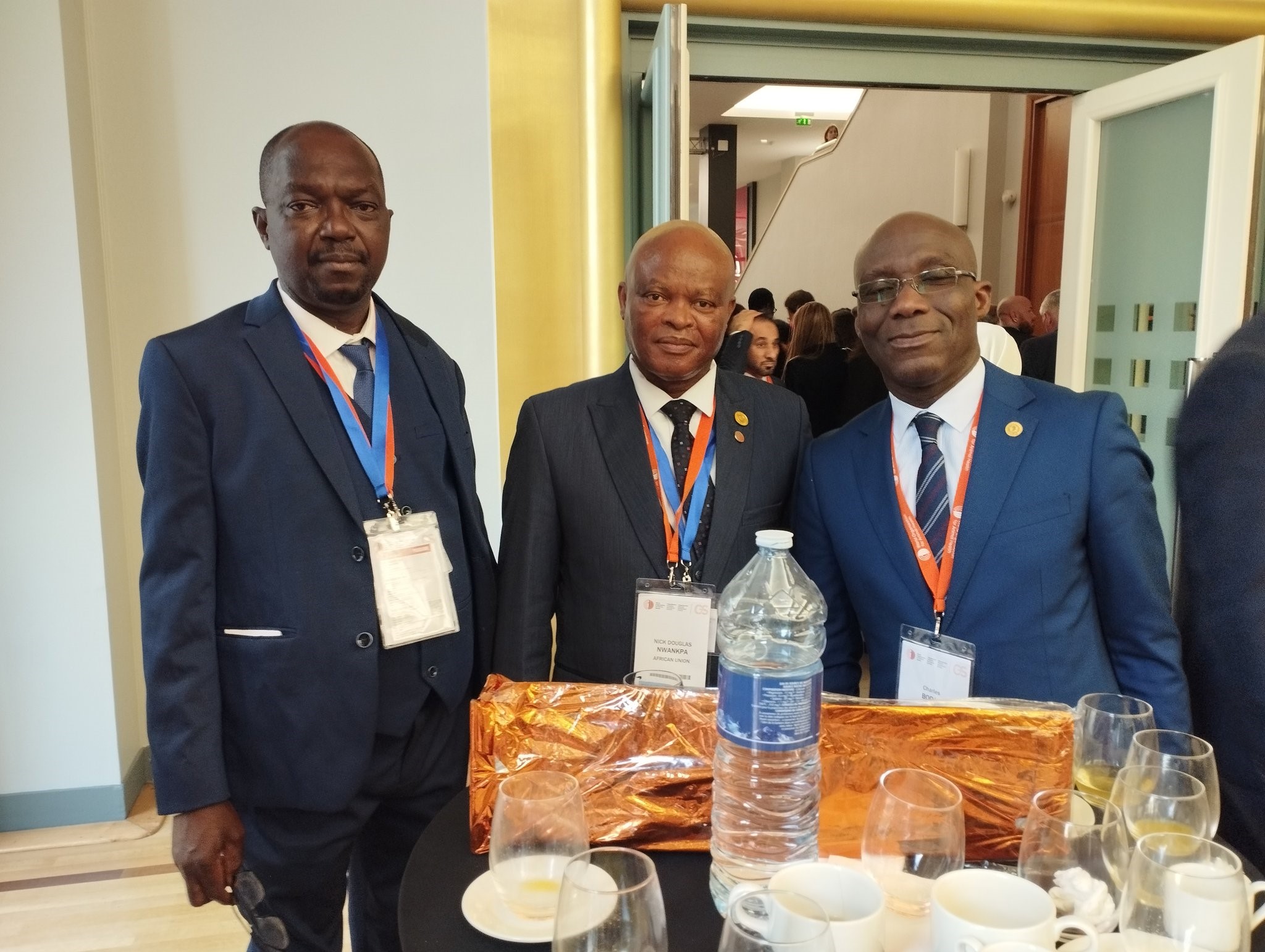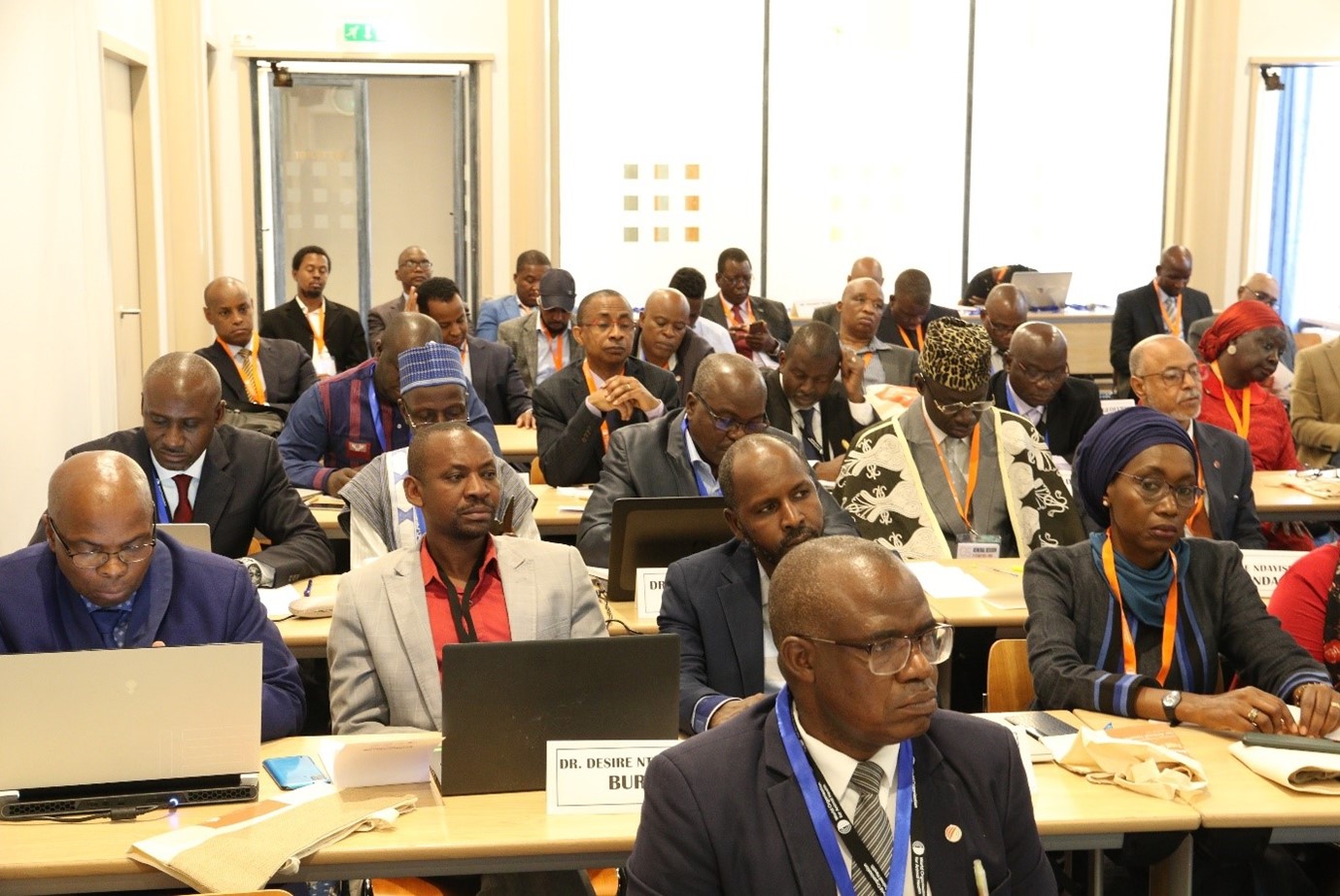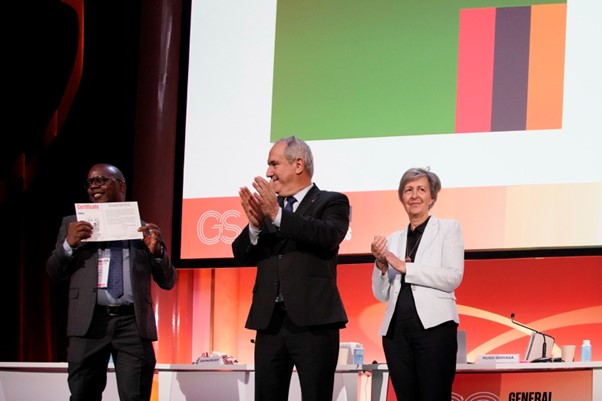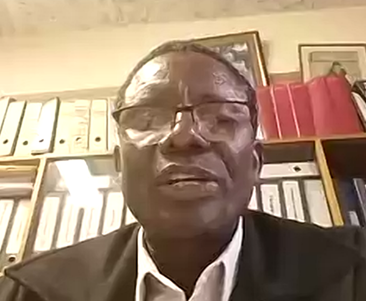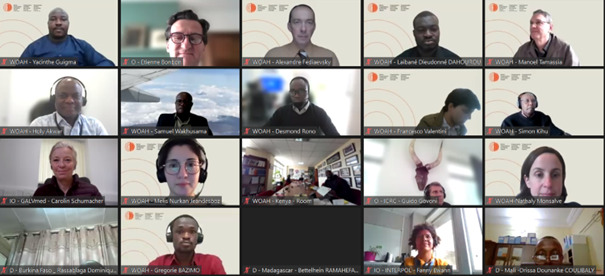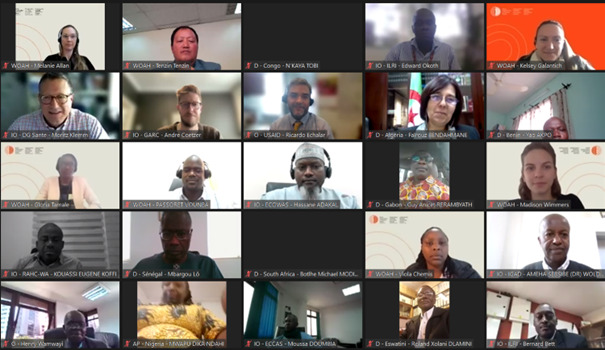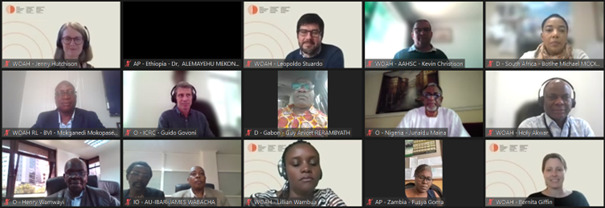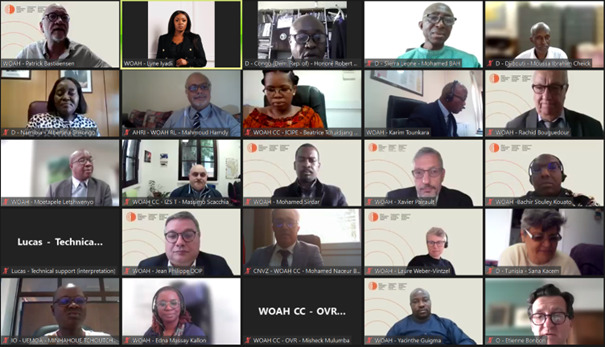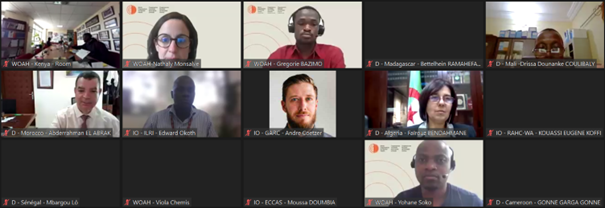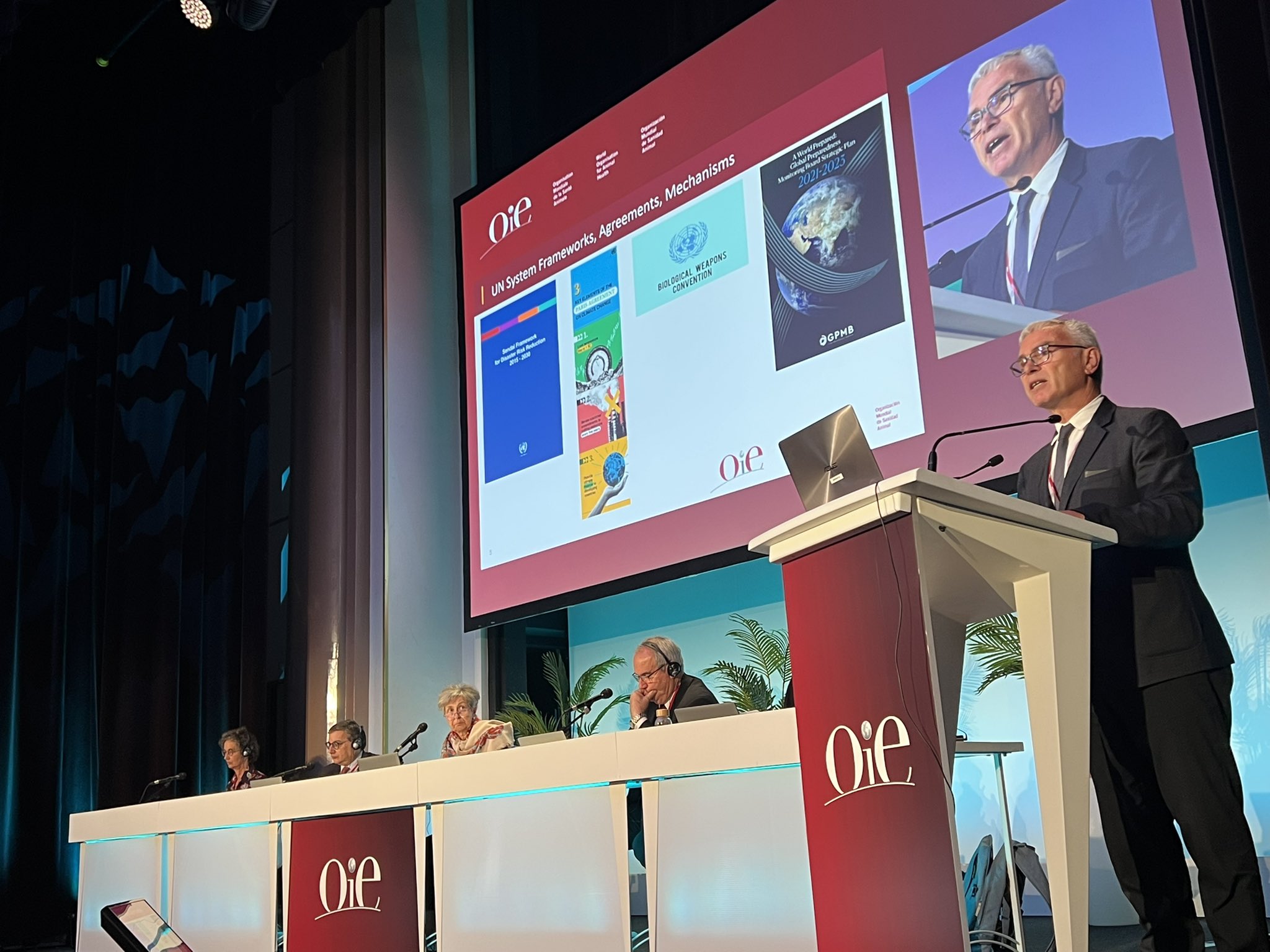
Well over 1,000 participants from Member countries and territories joined the first post-pandemic General Session, in person, representing national WOAH Delegates, as well as WOAH experts, selected staff and representatives of international, intergovernmental, regional and national organisations. Thirty-eight (38) African countries were represented at the event. In addition, more than 600 participants followed the livestream.
The opening ceremony was held in the presence of several Ministers and Members of Government of WOAH Member Countries and Territories, as well as WOAH President , Dr Hugo Federico Idoyaga Benítez (Paraguay), and WOAH Director General , Dr Monique Eloit.
With a format exclusively intended to be face-to-face (only livestream broadcasting was available), meeting the quorum was challenging as many Delegates did not make it to Paris, because of visa issuance issues, or because they were not eligible for voting.
This 90th General Session not only endorsed important new standards and accredited new institutions, but it also changed the format of the event itself, with the introduction of the Animal Health Forum and dedicated time slots for side-meetings, bilateral meetings and information kiosks.
Ministerial addresses were delivered by several Ministers attending of which two Ministers were from the Africa region, H.E. Fidelis Molao, Minister of Agriculture, from Botswana, as well as H.E. Amadou Dicko, Deputy-Minister of Agriculture, Livestock and Fisheries Resources from Burkina Faso. The former emphasised the importance of transboundary animal diseases such as FMD, CBPP, PPR and rabies for his country and highlighted the Launch of the Pan-African PPR Secretariat (PAPS), earlier that day. He also referred to Botswana’s approach to One Health and the National Action Plan against AMR, and closed in mentioning the recently concluded 25th Conference of the Regional Commission for Africa, hosted in Gaborone, Botswana.
The latter acknowledged the support received from WOAH in terms of PVS Pathway missions, vaccine bank deliveries and the support provided by the animal health component of the PRAPS (Projet Régional d’Appui au Pastoralisme dans le Sahel), for which WOAH is the implementing partner. He also highlighted the need to give attention to persistence and spread of High pathogenic avian influenza in several African countries thus the need to identify control methods. He emphasised the importance of veterinary services and called for financial support for better action against animal health challenges.
Other opening remarks were delivered by Ministers from France, Paraguay, Uzbekistan and Vietnam, along with the President of the Canadian Food Inspection Agency (CFIA), the Deputy Director General of the Food and Agriculture Organisation (FAO) , the Commissioner for Health and Food Safety of the European Commission and the Secretary-General of the Convention on International Trade in Endangered Species of Wild Fauna and Flora (CITES).
The high-level panel addressed three themes, which were discussed in relation to the global HPAI epidemic. The panelists were :
Theme 1: Major concerns of High Pathogenicity Avian Influenza (HPAI)
It was noted that between 2005 and 2022, HPAI has caused the death or culling of over 500 million poultry worldwide. The major concerns of HPAI in African, were discussed by Mr. Amadou Dicko, who noted that poultry farming is practiced by more than 80% of the populations in developing countries and constitutes a means of subsistence. The major concerns raised were:
The Director General of WOAH also raised a concern related to vaccination of poultry against HPAI. She noted it would be difficult to promote vaccination of poultry against HPAI, if some countries as those in LMICs are not able to pay for vaccination. Dr Ms. Maria Semedo of FAO also highlighted the need to strengthen national capacities of animal health systems for prevention and early detection. She raised the importance of supporting farmers with biosecurity measures especially in LMICs where people live in close proximity with their animals.
Theme 2: Cross-sectoral collaboration
Intersectoral collaboration is undertaken when managing zoonotic disease outbreaks. Mr. Amadou Dicko noted that prior to occurrence of HPAI in African countries, there were barriers in collaboration between stakeholders in animal and human health. The occurrence of recent HPIA epidemics, has however, fostered these intersectoral collaborations in many countries, noting the importance to tackle HPAI with a One Health approach. Intersectoral collaborations still need to be strengthened in many countries in Africa, with the support of the Quadripartite (WHO-WHO-FAO-UNEP) and other relevant networks such as OFFLU and GF-TADs.
Theme 3: Access to information and tools for better management of health crises
In discussing this theme, it was noted that many countries have undertaken the Performance of Veterinary Services (PVS) evaluation, which was the main tool to assess gaps in the competencies of national veterinary services. The need to strengthen financing and investment for animal health sector to close the gaps identified in PVS evaluations, was highlighted. Some needs for tools were expressed: for instance, tools for data collection and processing, diagnostic, and vaccination planning. The FAO panelist, Dr Maria Semedo commented that the Quadripartite organizations were supporting countries with science-based tools for disease detection and preparedness, biosecurity, information-sharing and assessment of One Health investment. However, the need for a skilled veterinary service with capacity to utilize such tools, was emphasized.
More concerns from the floor were raised on how cooperate across continents to address HPIA among migratory wild birds. The issue of sustainable funding for OH at the country level in Africa was also raised. The WOAH Director General highlighted that the pandemic fund, which is hosted by the World Bank is a major funding mechanism to countries. She further urged delegates to advocate for national funding for One Health in their respective governments.
During the opening ceremony, the President of the World Assembly, Dr Hugo Federico Idoyaga Benitéz (Paraguay) and the Director General, Dr Monique Eloit officially acknowledged the achievement of three award recipients and commended the leading role these individuals have played in animal and public health, which in turn has enabled us to work towards a healthier and more sustainable world. Among them, there is the Gold Medal granted to Dr Thomas Mettenleiter (Friedrich-Loeffler Institute, LFI) who in turn paid homage to former President of the World Assembly of Delegates and Delegate for Germany, Dr Karin Schwabenbauer, and reciprocated by gifting a celebratory medal of the 125th anniversary of the FLI to the Director General and President of WOAH.
A Meritorious Service Award was awarded to Dr David Swayne of the United States Department of Agriculture (USDA), internationally renowned animal influenza expert and one of the scientists spearheading the WOAH – FAO Network of expertise on animal influenza (OFFLU).
The awarding of the second Meritorious Service Award was supported by Dr Vessaly Kallo, WOAH Delegate of Cote d’Ivoire, on behalf of the African Members. Recipient is One Health concept pioneer Dr Jacob Zinsstag (Swiss Tropical Public Health Institute), who is well known in (West) Africa for his extensive work on One Health-based approaches to controlling rabies, brucellosis and tuberculosis (e.g. in Chad)
Dr Papa Seck, Presidential Advisor on Animal Health, Livestock and Fisheries and Global Health Security, Senegal, during his statement to the high-level panel on avian influenza.
The Technical Item of the first-ever WOAH Animal Health Forum was Avian Influenza. During two consecutive days (three, if one counts the high-level panel discussion on the same subject on the opening day) four sessions covered several surveillance, counter measures and policy aspects:
Experts and attendees discussed the strategic challenges faced for the effective use and implementation of existing science-based disease control strategies. Furthermore, they explored response strategies, required adaptations and best disease control practices and agreed on the key success factors and further areas for development towards HPAI global control. During session 1, it was noted that the global epidemiological situation was lacking in its coverage of information from Africa, due to limited data. In addition, challenges were noted regarding vaccination as a practice in prevention of HPAI, especially with inactivated or killed vaccines, considering the potential impacts in international trade and potential risk of virus mutations. The African HPAI situation was highlighted by Dr Roland Dlamini (Eswatini Delegate), who displayed the perspective of surveillance and early warning of HPAI in African countries. He raised several points for consideration including the need to monitor HPAI in wildlife and water bodies, backyard poultry systems which are found in both rural and urban areas, as well as issues with commercial production systems.
Dr Frank Wong (OFFLU) delivered an overview of the strategic challenges in Regional coordinated approach to intelligence gathering for HPAI, while Dr Thomas Mettenleiter (FLI), discussed the rationale of adopting the One Health approach for surveillance of HPAI, in wild birds, domestic poultry as well as in mammalian hosts such as carnivores and pigs, which could act as sentinel hosts.
The current challenges in implementation of prevention strategies for HPIA were discussed, focusing on compartmentalization, zoning and vaccination. Delegates were reminded of WOAH standards for compartmentalization, zoning and vaccination of HPAI, without neglecting the importance of housing and biosecurity measures for poultry. The importance of regional coordination and collaboration through the GF-TADs mechanism were emphasized, while encouraging adapting strategies to all levels and embracing Public – Private Partnerships (PPP)
In conclusion, the Forum acknowledged the importance of HPAI as a One Health issue that spreads globally, impacts biodiversity including wild and domestics birds, mammals, and humans. Prevention, detection, and response to HPAI requires dedication and robust work. To address HPAI challenges stakeholders (public sector, private sector, civil society organisations, NGOs, IGOs) must work together with trust and transparency at global, regional, national, and sub-national levels. Experts emphasized the availability of tools and standards that should be adequately used. It was recommended that WOAH leads the development of guidelines together with other quadripartite organizations to effectively and efficiently implement the HPAI Control strategy.
The resolutions of the Animal Health Forum on Avian influenza, were read out to the Delegates for comments. The resolutions were adopted with minor changes.
The annual report of the Director General, as presented by Dr Monique Eloit, was designed as a selection of highlights, not a comprehensive report. Structured along the strategic objectives (5) of the 7th Strategic Plan, she presented the following achievements (and in some cases, expected achievements by the end of 2023) :
The important achievements to look out for in 2023 are the public interface of the ANIMUSE platform, the PVS information system, the platform for the monitoring of official statuses and self-declarations, the navigation tool for standards (searchable by commodity, across chapters), as well as thematic studies to be conducted as part of the Observatory work plan (e.g. on compartmentalisation).
In concluding her report, the DG focused on institutional changes to the Organisation, as part of the strategic objective 5 (efficiency and agility), such as the strengthening of the procurement rules, internal controls and a redesigned budget structure. She also highlighted the ongoing work on gender and presented several “informal consultation processes” ongoing, such as the Foresight programme and the proposed review of the Organisation’s Basic Texts. In this respect, analyses and benchmarking against other international organisations will commence soon, looking at the institutional aspects, the technical – scientific aspects, and the financial aspects, through the World Fund and the Regular Budget.
Interventions by WOAH Delegates from Benin and Senegal were supportive of the Report SG-1.
Meeting of the WOAH Director General with line-Ministers (responsible for animal health) of African Members, along with African Union officials and WOAH Regional Representatives. Picture © Communication (woah) 2023
Dr Karim Tounkara, WOAH Representative for Africa presented One Health activities in Africa. He noted that significant progress has been made on Global initiatives such as Elimination of human deaths by dog-mediated Rabies by 2030 and antimicrobial resistance (AMR). Dr Karim also highlighted activities in Africa aimed at strengthening their multisectoral collaboration. The work of WOAH to supported members to strengthen their prevention, detection, and response of viral hemorrhagic fevers in several countries.
More information on the regional highlight of One Health activities in Africa at the 90th General Session, is available here: Steering One Health in Africa – WOAH – Africa
The WOAH Delegates adopted and revised a number of international standards (including new chapters) for terrestrial and aquatic animal diseases and, in summary, a total of:
New standards will be published in the respective Codes in three languages by August 2023 and will come into force on 1 January 2024. Some current provisions, such as the use of the current BSE questionnaires, will remain in force until May 2024, despite a new questionnaire having been adopted at the present General Session.
The President of the Terrestrial Code Commission, Dr Etienne Bonbon (France), presented the work programme conducted since the previous General Session (2022) and submitted a number of revised and new standards for approval to the World Assembly of Delegates. Several definitions and Chapters revised and adopted to improve the implementation of such recommendations by Members
Despite the support of the African Members of WOAH, as represented by the WOAH Delegate for Eswatini, Dr Roland Dlamini, the proposed changes to the Code chapter on foot-and-mouth disease (FMD) faced strong opposition from the 27 European Union Members, which highlighted the risk to infection free countries of importing vaccinated animals or animal products, harvested from vaccinated animals. It was decided that the Code Commission will review and further work on the chapter and put it up for adoption at the next General Session.
A partial revision of the rabies chapter (articles 8.14.6bis., 8.14.7. and 8.14.11bis) led to concern from many countries, including Cote d’Ivoire, Burkina Faso and Gabon, on behalf of all African Members, in respect of the shortening of the time span between vaccination and titration from 90 days (3 months) to 30 days (one month) for legal movement of dogs. As a result of these concerns, only article 8.14.11bis was adopted.
Chapter 8.15. on Rift Valley Fever (RVF) underwent considerable revisions, based on new scientific insights and the proposal to envisage regaining freedom from the disease (eradication) after an absence of infection of no less than 10 years. The term “10 years” led to a bit of confusion as it is also theoften-quoted inter-epidemic period between outbreaks, leading to requests for clarification from the WOAH Delegate for Eswatini, on behalf of the Africa region. Following these clarifications, which suggest that a country must not necessarily remain endemic after an initial outbreak, the revised chapter was adopted.
For Chapter 10.9. on Newcastle Disease Virus, the definition of “poultry” in that chapter was deleted as it is already included in the Glossary of the Code.
The chapter on Bovine Spongiform Encephalopathy (11.4) also underwent a comprehensive review and has been circulated seven time. It’s adoption was again postponed last year. The purpose of the review was to simplify the surveillance principle to demonstrate either status (controlled risk or negligeable) risk, becoming less prescriptive and more cost-affordable. It was also again clarified that atypical BSE is not the focus of this chapter, but only classical BSE. The WOAH Delegate for Zimbabwe, on behalf of the Africa region, raised the concern that the surveillance and testing for BSE, even after adoption of this proposal, would remain expensive and laborious, especially since there is not evidence of BSE ever having been introduced on the African continent. Other countries again insisted that atypical BSE should be made notifiable. Africa did not support the adoption of this chapter. Nonetheless, this Chapter was adopted -majority against minority- with one opposing vote and 10 abstentions.
Another lengthy decision evolved around the proposed deletion of the word “suffering” from the definitions of Chapter 7.8. on The use of animals in research and education. The current definition, proposed for deletion, defines it as an “unpleasant, undesired state of being that is the outcome of the impact on an animal of a variety of noxious stimuli and/or the absence of important positive stimuli. It is the opposite of good welfare”. Given the concerns of many countries, including Botswana, it was decided to move the definitions of “pain” and “distress”s to the Glossary, as initially intended, but not to delete and to leave the definition of “suffering” as-it-is, for the time being.
While new chapters for new diseases were adopted, i.e. on Theileriosis in sheep and goats (infection with Theileria lestoquardi, T. luwenshuni and uilenbergi), Leishmania (Leishmaniosis) and MERS-CoV (Chapter 16.1. as the first chapter part of the new Camelids section), others represent mere name changes, i.e. Contagious equine metritis (12.2) or Equine piroplasmosis (12.7). Note that Camel pox is also a listed disease, but only a Manual chapter was approved in 2021 (3.5.1). Likewise the new Code chapter on Leishmaniosis completed Chapter 3.1.11. in the Manual, already adopted in May 2021.
As always when new disease chapters are added, Chapter 1.3. on Diseases, infections, and infestations, listed by WOAH, has to be amended in consequence.
Interestingly, as the world moves to a broad adoption of the One Health concept, typical Code terminology such as enzootic and epizootic will be abandoned for the benefit of the more holistic use of the words endemic and epidemic.
Dr Emmanuel Couacy-Hymann (Côte d’Ivoire), President of the Biological Standards Commission (BSC), presented the annual activity report (two statutory meetings held in September 2022 and February 2023). Afterwards, he provided an overview of the Manual of Diagnostic Tests and Vaccines for Terrestrial Animals texts proposed for adoption, 2 glossary terms and 15 chapters, all of which were adopted without objection or abstention.
On this chapter, the Delegate of the USA commented that there are now vaccines against American foulbrood in the USA (approved by the USDA). The Commission noted this information.
3.3.13. Marek’s disease: added new sections on the nature and classification of the pathogen, zoonotic potential and biosafety and biosecurity requirements and diagnosis
The distribution and activities of the reference laboratories and collaborating centres were then presented, highlighting the importance of WOAH twinning projects to improve laboratory capacity worldwide.
Dr Couacy-Hymann then concluded his speech by presenting the new commercial diagnostic test kits that were registered (five in total):
Register of terrestrial animal diseases diagnostic kits validated and certified by WOAH
Feedback and questions from the floor were provided by WOAH Delegates from Algeria, Benin, Botswana and Senegal.
The President of the Scientific Commission for Animal Diseases (SCAD), Dr Cristóbal Zepeda (United States of America), focused his intervention on four global strategies and initiatives:
The President of the Aquatic Animal Health Standards Commission, Dr Ingo Ernst (Australia), in his presentation highlighted all the activities conducted by the Commission over the year and provided an overview of the Code texts proposed for adoption. Many of these were related to changes in taxonomy of, or newly identified susceptible species to some of the already published standards in chapters 9.3, 9.4., 9.5., 10.9, 11.3 and 11.4.
In May 2022, a new disease (infection with Tilapia lake virus or TiLV) was listed according to the criteria of Chapter 1.3 of the Aquatic Code. This year, the corresponding Code chapter (10.X) was presented for adoption, but was opposed by the European Union, as represented by the WOAH Delegate from Finland, as well as Norway. It was eventually approved on the condition that some of the contentious articles would be labelled “under study”.
For the Aquatic Manuel, a more comprehensive review (case definitions, advanced diagnostic techniques) has been undertaken of the following chapters/diseases, all of which were adopted :
To bring the Code and the Manual in line in respect of new susceptible species, the following chapters where also adapted and changes adopted:
The President of the Aquatic Animal Health Standards Commission concluded his presentation by highlighting the AAHSC workplan for 2023, which includes four new chapters and some applications for compartmentalisation.
The World Assembly later approved (by electronic voting) the listing of a new diagnostic kit as fit-for-purpose for the diagnosis of WSSV (Register of aquatic animal disease diagnostic kits validated and certified by WOAH) : Innocreate Bioscience WSSV RP Rapid Test Kit.
African Union delegation (IBAR and PANVAC). Fltr: Drs Hiver Boussini, Nick Nwankpa and Charles Bodjo. Picture (c) twitter (AU-IBAR) 2023
Dr Jenny Hutchison, Head of the World Animal Health Information and Analysis Department, and Dr Laure Weber-Vintzel, Head of the Data Integration Department, jointly gave a presentation on the “Animal Health Situation Worldwide”.
Initially, the 2022 achievements and 2023 targets for World Animal Health Information System (WAHIS) and World Animal Health Information and Analysis Department (WAHIAD) were presented.
An overview was then given of the trend in immediate notifications (IN), follow-up reports (FUR) and six-monthly reports (SMR) over the last 10 years approximately. Concerning the latter, it was emphasised that, as of 2018, there has been a significant decrease compared to the previous 7 years. Consequently, all countries were reminded of the importance of reporting and were urged to put more effort into it. In this regard, it was mentioned that three information kiosks were available to participants during the GS and that supporting materials, an online help desk and the possibility to request one-on-one training sessions on the WAHIS portal functionalities are available.
Dr Hutchison also spoke about the spread of Lumpy skin disease (LSD), emphasising the importance of reporting on the status of the disease (declining after 2018) and recalling how effective control relies on early detection and vaccination. Current gaps, on the other hand, lie mainly in diagnostic capacity and vaccine availability.
Dr Weber-Vintzel spoke about reporting on disease-specific global strategies: FMD, PPR, Rabies, ASF, and – in general – Aquatic Animal Health (Strategy). The increase/decrease of reporting over the past years, in association with an increase in legal reporting obligations at national level, and the reports on the adoption of surveillance measures and control/preventive measures (e.g. vaccination, movement control, border control) were discussed. Lastly, she presented the national and regional distribution of National Reference Laboratories, encouraging the execution of twinning programmes to improve countries’ diagnostic capabilities.
Feedback and questions from the floor were provided by WOAH Delegates from Algeria, Benin, Chad and Senegal.
The Chair of the Wildlife Working Group, Dr. William B. Karesh, presented the activities of the group over the past 12 months and informed the Members on the collaboration of the Working group with the Specialist Commissions, namely the Scientific Commission, the Terrestrial Commission and the Aquatic Commission. He then presented the impact of High pathogenicity avian influenza (HPAI) on the health of wild animals, including the health of people working with these animals. Dr. Karesh also spoke about support for wildlife disease reporting, review of the PVS Aquatic Tool, support for WOAH’s engagement with the Convention on International Trade in Endangered Species of Wild Fauna and Flora (CITES) and the International Union for Conservation of Nature (IUCN) and concluded his presentation with the terms of reference for the training of wildlife focal points.
The report of the AMR Working Group was presented by the Chair of the Group Dr. Tomoko Ishibashi (Japan). She announced that Prof Moritz Van Vuuren (South Africa) and Dr Gerard Moulin (France) are retiring and will no longer be serving the Group, hence new members will be nominated to join. This Group was created by decision of the Director General following the adoption of Resolution 14 by the 87th General Session of the OIE in 2019.
She then presented the activities, highlighting the 2nd revision of Chapter 6.10 to include non-food producing animals and the environment, which is currently underway. No feedback was received from Africa and the Middle East regarding this chapter. In addition, Dr Ishibashi highlighted the preparation of the Technical Reference Document for antimicrobials of veterinary importance for cattle and domestic carnivores, scheduled for completion in 2024. Dr Tomoko also presented the ANIMUSE platform for the collection of antimicrobial use data, which was officially launched on 19 September 2022, and the training of focal points for veterinary products carried out in all the WOAH regions. Dr Ishibashi reiterated the need for reviewing WOAH’s AMR Strategy and expanding its scope to companion animals, in addition to revising the WOAH List of Antimicrobial Agents of Veterinary Importance, Chapters 6.8 and 6.9 in the near future.
Highlights were presented from the recently published WOAH’s 7th Annual Report on Antimicrobials Agents Intended for Use in Animals. The report shows a 13% decline in the amount of antimicrobials used in animals from 2017-2019. African countries are increasingly using animal biomass for calculation of antimicrobial use, while a significant reduction in consumption is observed for tetracyclines and polypeptides. Other points presented were the repository of antimicrobial use field-level studies, which will help instigate filed level reporting and the launch of an interactive alert and monitoring system for sub-standard and falsified products.
The co-chair of the ASF Working Group (WG) Dr. Gregorio Torres from WOAH, presented the agenda of the session as mainly to discuss and agree on the Terms of Reference (ToRs) of the Global Coordination Committee (GCC) for ASF, share experiences from different regions and agree on next steps. The objective of the GCC is to strengthen inter-regional coordination and enhance implementation of the Global Initiative (GI) through identification of key activities that can advance the progress in GI, promotion of synergies and complementarities between regions and sharing recommendations to the WG. The outcomes of the GCC will be: global coordination, identification of priority activities, knowledge sharing, improve linkages between regional and global priorities and identification of opportunities for cross-regional collaboration. It was proposed that the meeting would be chaired on rotational basis starting with oldest Standing Group of Experts (SGE), i.e., Europe, followed by Asia Pacific, then Americas and lastly Africa, being the youngest. The meeting would be organized annually and the ASG WG would be the technical secretariat. The meeting agreed on one week for members to review ToRs, after which it should be submitted for adoption in the first annual meeting to be convened.
Launch of the GF-TADs GCC for ASF, chaired by Dr Bernard Van Goethem, Chair of the RSC of the GF-TADs for Europe (on the left, with microphone) with the assistance of WOAH Deputy Director General, Dr Montserrat Arroyo (on the right). Picture © J. Perchet (woah) 2023
The presidents of the four regional GF-TADs Secretariats presented a brief about ASF in their region. The information and tools presented have been shared and can be accessed from the respective GF-TADs websites. Dr. Nick Nwankpa (AU) briefed the meeting about ASF in Africa, which is endemic in about 30 countries in sub-saharan Africa, with the latest notifications submitted by countries in Southern Africa. He informed the meeting about the revised ASF Africa Strategy which is expected to be validated by the AU Specialized Technical Committee responsible for agriculture, rural development and environment before endorsement by the AU Summit of Heads of States.
From the discussion, it was clear that priority areas of focus should include: surveillance, laboratory capacity for diagnosis, biosecurity to ensure long-term impact on food security and business continuity, vaccines and vaccinations, exchange of expertise and wild boar management, the latter being region specific.
On 21 May 2023, the inauguration of the Pan–African Secretariat for Peste des Petits Ruminants (PPR) eradication in Africa took place in the margins of the 90th General Session in Paris, France. The establishment of the Secretariat is indicative of Africa’s resolve to eliminate PPR and will serve as a mechanism for orchestrating PPR eradication efforts across the African continent by the year 2030.
Attendance of WOAH Delegates and delegations at the launch of the Pan-African PPR Secretariat, on Sunday 21 May at the Maison de la Chimie in Paris. Picture © Communication (woah) 2023
The Pan African PPR Secretariat (PAPS) is composed of institutions under the African Union Commission (AUC), namely the Interafrican Bureau for Animal Resources (IBAR) and the Pan African Veterinary Vaccine Centre (PANVAC), as well as international organisations such as the Food and Agriculture Organisation (FAO) and WOAH, who fall under the Global Framework for the Progressive Control of Transboundary Animal Diseases (GF-TADs) Africa umbrella. Hon. Seydou Cissé, the Ambassador of Côte d’Ivoire to FAO Rome, read the Paris Declaration on PPR eradication in Africa. The Pan-African PPR Secretariat, entrusted with PPR eradication in Africa, will be established in AU-IBAR, located in Nairobi, Kenya.
More information : https://www.au-ibar.org/au-ibar-news/launch-pan-african-secretariat-peste-des-petits-ruminants-ppr-eradication
The Delegate of Zambia, Dr Geoffrey Muuka (left) receiving the certificate of endorsement by WOAH of the official control programme against dog mediated rabies. Picture © Twitter (woah) 2023.
The WOAH World Assembly issued a total of six new official animal health statuses and two endorsements of disease control programmes. Of note for Africa is the endorsement by WOAH of the official control programme against dog mediated rabies of Zambia.
Eight (8) new Reference Centres were recognized by the World Assembly (both terrestrial and aquatic). Two of these Centres are situated in Africa, i.e. Egypt :
The Central Laboratory for Evaluation of Veterinary Biologics (CLEVB), Abbasia, Cairo,
EGYPT
Faculty of Veterinary Medicine, Cairo University, Oula, Giza District, Giza Governorate,
EGYPT
The second (public) administrative session, on Thursday 25 May very much focused on the financial situation of the Organisation, with approximately 22% of Members (40) lagging behind in their statutory contributions to the Organisation, 10 of these accumulating more than 10 years of arrears and representing the bulk of the outstanding contributions. As a result of this, the 2020 – 2022 pandemic, and the worldwide inflation, the Delegates were asked to consider a third 15% increase in the contribution of their choice, bringing e.g. the contribution for Category 6 from EUR 30,000 to 35,000. While several countries opposed this increase, the resolution was eventually adopted with 2 objections and 14 abstentions.
The External Auditor Report also commended WOAH for being financially solid and having a budget that is fully controlled.
A total of three WOAH representations were renamed to align the style and length of the title with those of other representations. This includes the Nairobi-based representation, which is renamed Sub-Regional Representation for Eastern Africa, instead of Sub-Regional Representation for Eastern and the Horn of Africa.
In addition, the Sub-Regional Representation in Abu Dhabi is renamed Sub-Regional Representation for the Arabian Gulf, and the Sub-Regional Representation for Central America is renamed Sub-Regional Representation for Central America and the Caribbean
To align the name of the Regional Commission for Asia, the Far East and Oceania with the name of the corresponding Regional Representation, its name was changed to Regional Commission for Asia and the Pacific.
The call for experts for the various Specialised Commissions will open on 3 July and close on 8 September. African experts are strongly encouraged to apply, with the support of their Delegate. For advice and submission, please consult: Call for experts to join WOAH’s Specialist Commissions – WOAH
Signature of the Memorandum of Understanding with the International Livestock Research Institute (ILRI). Left : Dr Appolinaire Djikeng, Director General of ILRI. Right : Dr Monique Eloit, Director General of WOAH (signing). Picture © Twitter (woah) 2023.
One new Memorandum of Understanding (MoU) was approved, between WOAH and the International Livestock Research Institute (ILRI), which Headquarters is based in Kabete, Nairobi (Kenya). This is actually a redefinition and renewal of the 2004 Cooperation Agreement.
The island nation of Saint Vincent and the Grenadines (Americas region) joins WOAH as the 183rd Member.
The Regional Commission for Africa met by videoconference on 15 May 2023 and the meeting was was attended by up to 135 participants, including Delegates and observers from 35 Members of the Commission, and representatives from 15 international or regional organisations. Observers were the Chairpersons and members of the Biological Standards Commission and the Terrestrial Animal Health Standards Commission. The meeting was chaired by Dr Honoré Robert N’lemba Mabela, President of the Regional Commission for Africa and Delegate of the Democratic Republic of the Congo, accompanied by Dr Karim Tounkara, Regional Representative for Africa.
Dr Albertina Shilongo, Vice President of the of the Regional Commission for Africa and Delegate for Namibia, briefly described the main conclusions from the topics presented and discussed during the 25th Conference of the Regional Commission which was attended by a total of 113 participants, comprising WOAH Delegates and representatives of 43 Members of the Region and senior officers from 15 regional, international, and national organisations and institutions.
Dr Alemayehu Mekonnen, on behalf of Dr Fikru Regassa Gari, Delegate of Ethiopia, reiterated his country’s offer to host the 26th Conference of the Regional Commission for Africa in February 2025. Exact dates will be defined at a later stage in consultation with WOAH Director General.
Dr Roland X. Dlamini, Member of the Council and WOAH Delegate of Eswatini, making a statement during the Regional Commission Meeting on 15 May 2023
The Regional Commission proposed the following technical item (with questionnaire to Members) for inclusion in the agenda of the 26th Conference of the Regional Commission for Africa:
“Control and eradication of CBPP in Africa: Challenges and Strategies for a CBPP Free Africa”
The Regional Commission proposed the following three strategic topics of global interest to be addressed by the WOAH through various means:
Dr Jean-Phillipe Dop, WOAH Deputy Director General, Institutional Affairs and Regional Activities, explained the process regarding the proposal to be presented via a resolution for adoption by the World Assembly of Delegates, to change the name of the Subregional Representation in Kenya currently referred as “Sub-Regional Representation for Eastern Africa and the Horn of Africa” to be renamed “Sub-Regional Representation for Eastern Africa”.
Dr Nick Nwankpa, the acting Director of AU-IBAR, introduced the regional perspective for the control of animal diseases by highlighting the key animal health strategies and guiding frameworks in the Africa Region.
Dr Charles Bodjo, from AU-PANVAC, presented AU-PANVAC’s work as a WOAH Collaborating Centre for the quality control of veterinary vaccines and a FAO Reference Centre for technical assistance in quality control of veterinary vaccines. He also mentioned that, following the site inspection by the Rinderpest Joint Advisory Committee (JAC), it was recommended in January 2023, to extend the designation of AU-PANVAC to an FAO-WOAH Rinderpest Holding Facility Categories A and B until 31 May 2026. It was clarified that AU-PANVAC is not designated as a Rinderpest sequestration centre but a holding facility.
Ms. Emily Tagliaro, Head of WOAH’s Engagement & Investment Department, presented the Fund for Pandemic Prevention, Preparedness and Response (The Pandemic Fund) whereafter Dr Rahul Srivastava from WOAH’s Capacity Building Department delivered a presentation on PPP’s in the Veterinary Domain. The Public-private partnership (PPP) approach is a joint approach in which the public and private sectors agree on responsibilities and share resources and risks to achieve common objectives that sustainably deliver benefits. Ms. Jennifer Lasley, from the Capacity Building Department, briefly announced the PVS Information System which is under development and targeted for global launch at the 100th anniversary which will be commemorated during the 2024 General Session.
Dr Honoré Robert N’lemba Mabela thanked the Delegates who were no longer Delegates for their valuable services and contributions to the Organisation and welcomed the new Delegates appointed since 2022 annual meeting. He paid homage to the Delegate of Egypt, Prof. Abdelhakim Mahmoud Mohamed Ali, who passed away in the late 2022.
The next General Session (GS91) will take place from 19 – 23 May 2024, at the Maison de la Chimie in Paris, France, with the (online) regional commission meeting likely taking place on 13 May 2024.
